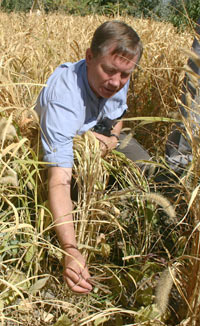Faculty call for 'brown revolution' to promote soil health

Peter Hobbs, adjunct professor of crop and soil sciences, is
coordinating a Sustainable Land Management group on campus to help foster a
"Brown Revolution" to improve soil health worldwide.
He invites fellow Cornell researchers to join him in fostering a "brown revolution" that promotes conservation agriculture, which involves minimal soil disturbance and the use of cover crops and crop rotations to naturally control weeds, pests and diseases. And he hopes many will become part of multidisciplinary collaborations as part of a new Sustainable Land Management group that he works with.
While the so-called green revolution transformed agriculture with fertilizers and pesticides, improved seeds and modernized farm management that led to huge jumps in production and yields, it also contributed to environmental degradation, Hobbs said. Soils in many parts of the world, such as South Asia, have suffered from excessive tillage, leading to erosion and nutrient mining. With the increased reliance on chemical fertilizers and pesticides, such biological amendments as manure and compost have not been added back to the soil, Hobbs said.
He hopes to improve soil health and reverse such land degradation by incorporating conservation agriculture. Healthy soils are essential for future productivity, Hobbs said. They have structure, aeration and water retention, fewer pathogens and better biological activity resulting in improved nutrient recycling needed by plants. "Business as usual will not get the job done," Hobbs said. "Soil health has to become part of the equation."
What are you doing for the "brown revolution" in agriculture?
Ed Winkle

No comments:
Post a Comment